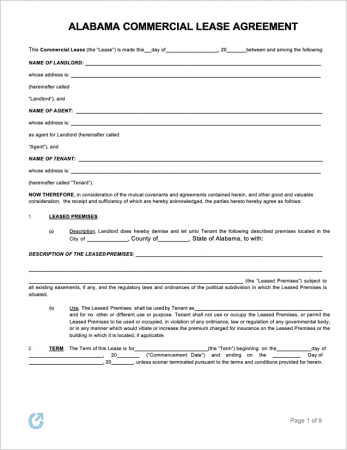
The Alabama Rental Lease Agreements are documents signed between a landlord and tenant for the renting of residential or commercial space. In simple terms, the agreement outlines each party’s obligations, including, but not limited to start and end dates (unless month-to-month), rent amount ($), utilities and services, and other miscellaneous expenses and commitments. Once an agreement is signed by the landlord and tenant it becomes a legally binding contract.

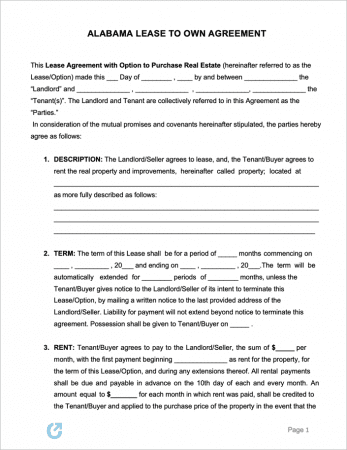
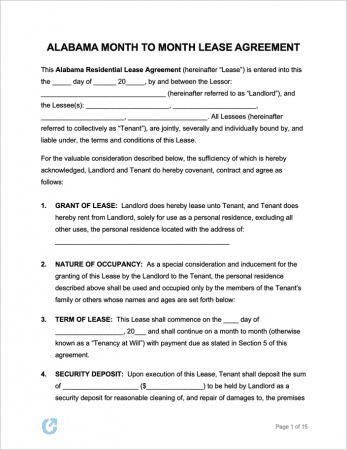
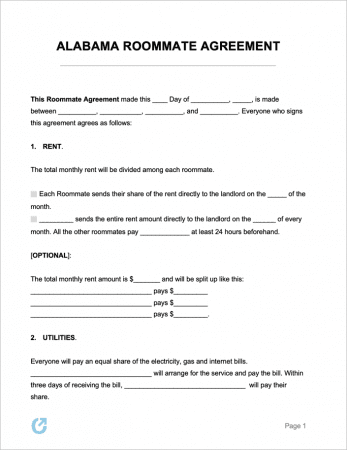
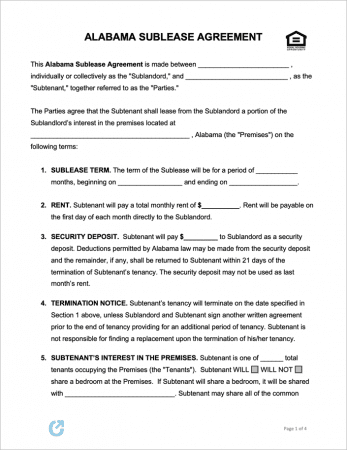
Owner Maintenance & Repairs
Enclosed Garage, Carport, or Storage Unit
Satellite Dish or Antenna
Resident Parking
Add-on or Change Roommate
Washer and Dryer
An Alabama Lease Agreement allows one (1) or more tenants to occupy a livable space in exchange for money paid on a regular basis. Before an agreement is signed, it’s highly recommended to have the tenant complete a rental application to verify employment, income, and credit history.
Landlord-Tenant Guides / Handbooks
In Alabama, rent is due on the date stated in the agreement. If nothing is specified in the form, rent should be paid on a monthly basis for standard leases, and on a weekly basis for week-to-week agreements. There is no grace period. (Section 35-9A-161(c)).
Emergency (§ 35-9A-303(b)(1)): Landlord may enter the residence, without the tenant’s consent, in the case of an emergency.
Non-Emergency (§ 35-9A-303(c)): Landlord may enter the residence with two (2) days’ notice by posting a note on the door of entry. The note must state the day and time the landlord intends on entering the property and is required that it be during reasonable times.
In accordance with § 35-9A-204, landlord’s are required to provide the following duties for tenants:
As stated by § 35-9A-301, the tenant has to uphold the following duties while bound by a lease:
Lead-Based Paint Disclosure: Required under federal law if the residence was constructed prior to 1978.
Names and Addresses (§ 35-9A-202): Landlord must write the contact information in the lease of either their name and address or the person authorized to manage the premises.
Retaliation (§ 35-9A-501(a)): In cases where the tenant has previously made a complaint to a government agency or institution, made a complaint with a landlord regarding a violation they committed, or becomes a member of a union, landlords cannot “retaliate” by removing services, raising the rent, or make threats if the tenant does so again.
Maximum Amount (Section 35-9A-201(a)): One (1) month’s rent. Landlords can require an additional deposit(s) for pets, alterations to the rental, and for tenants who pose a more considerable risk than the average renter.
Returning to Tenant (Section 35-9A-201): Sixty (60) days. If the landlord does not return the deposit within the time-frame, the tenant shall be owed double. If the landlord is to make deductions from the tenant’s deposit, such amounts must be clearly stated in a list and provided to the tenant via their forwarding address, or the last known address if none was provided by the tenant.
Deposit Interest: Not required in Alabama.
Uses of the Deposit: Landlords can make deductions from the deposit for covering the cost of any unpaid rent or tenant-caused damages to the property (that occurred from a breach of the lease).